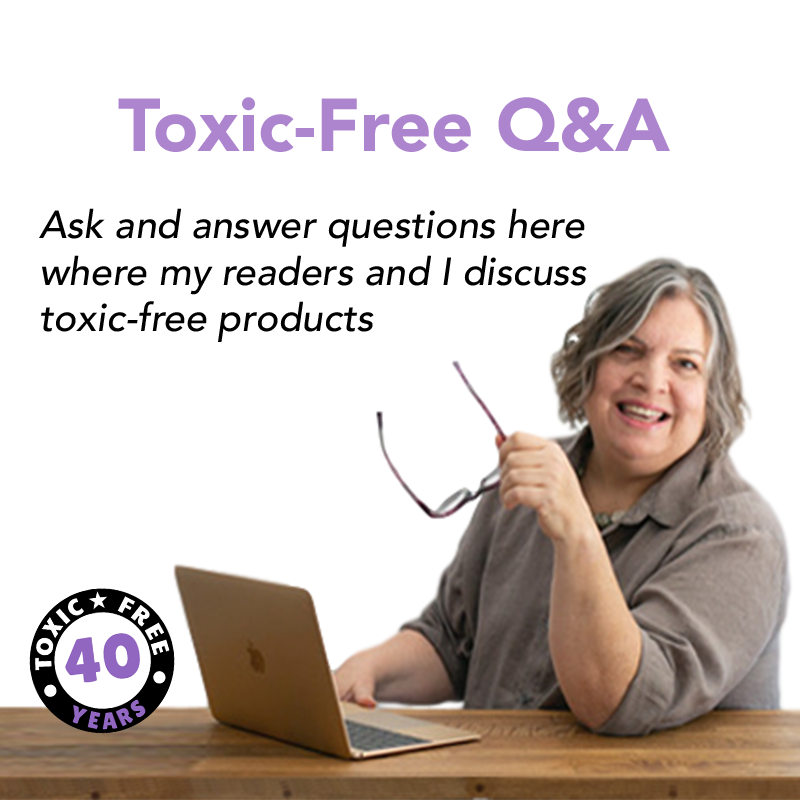
Submitted questions will be posted with my response by the following Tuesday or before.
Submitted comments will be moderated and approved within 24 hours.
Mercury exposure from broken light bulb
Question from TR
Last night my daughter knocked over a lamp and broke one of those new light bulbs. I vaguely remembered something about mercury and looked it up on the Internet and know I am scared to death. Do you know anything about this? I am wondering if once it has been cleaned up, if the mercury is gone as well as the danger? I couldn’t find any information about “the after effects”.
I am also wondering if this contaminated everything in the room? It broke by my bed. Is it safe for me to sleep in there?
Here’s a fact sheet about mercury: http://www.atsdr.cdc.gov/tfacts46.html
Also, read the first part of this about elemental mercury: http://www.calpoison.org/public/mercury.html. It talks about symptoms immediately after exposure. I think the danger is immediate, because it dissipates fairly quickly.
Yesterday the San Francisco Chronicle had a great article about CFL’s: San Francisco Chronicle: Confusion about fluorescent lighting. It points out a lot of the problems and offers some solutions. Near the end, under “If a CFL breaks” there are more detailed instructions about clean-up procedures.
Personally, I don’t use them. I use halogens.
Debra’s Answer
Here’s what I could find.
From Environmental Defense Fund:
It seems that the mercury is in the form of vapor, which will disperse. So once it has been cleaned up, it appears to be safe. Ventilation helps. I don’t think it has contaminated everything in the room.
Cast Iron Skillets made in China
[This post was re-created from an archive after being lost.]
Question from Joy
Hi Debra,
I recently bought a set of 3 cast iron skillets that had a “Made in China” sticker on them.
After washing and using them a few times,the black finish started coming off on the towel I dried them with. The inside of the pans started to look brown where the finish had come off.
Does this sound normal for cast iron? I have an old cast iron skillet that I picked up in a thrift store that is not doing this. Do you think it is safe to use the newer skillets?
What with the problems of items coming from China lately, I am afraid to use them.
Thanks for your help.
Debra’s Answer
I’ve had some cast iron skillets and I’ve never had any black finish come off on the towel. In fact, there shouldn’t be a finish at all, only the cast iron. Who knows what they might have added in China. This doesn’t sound right to me. The brown is probably rust, which does happen to cast iron if you don’t season it. Be sure to follow the directions for seasoning the pan before you use it (coat with oil, bake in the oven, etc). Your pans should have some instructions for this. If not, search the web for “season cast iron pan”.
See comment from Debra below for the explanation of this black coating.
Waterproof Boots
Question from Deborah
Melting snows and the resulting streams and waterfalls have turned my daily fresh air and exercise program into a project of “How to get from here to there without soaking my feet”, very important in the just-above-freezing temperatures. Most waterproof boots seem to be made from highly out-gassing materials. Gore tex uppers are okay after they’ve been aired out for a few weeks, but the waterprrof soles make my eyes burn and hamper my breathing. I always keep my shoes and boots outside on the dry porch as I know that the bottoms have picked up oils from asphalt and car engines. (Ever see the beautiful colors in parking-lot puddles? Free oil paintings without having to stand in line or pay admission to a museum!) I realize rubber makes good soles, but the what it’s made out of is crucial. Any ideas?
Thank you
Deborah from New England
Debra’s Answer
I understand. I have a pair of hiking boots that are years old that keep my feet nice and dry. But I’m not sure where to direct you for new ones.
Readers, any suggestions?
Debra 🙂
Glue for Shoe and Boot repair
Question from Laura
I need to repair my boots and shoes and am looking for a low toxic glue so I can still wear the shoes without getting sick. Someone else can repair them and I can probably put them somewhere to outgas for a while.The soles are typical synthetic rubber and the uppers of the boots are sheepskin(UGH) and of the shoes wool felt (Haflinger).
I”s very difficult for me to find footwear that fits and I don’t react to so this is important. There’s no cobbler in the area and the fumes in cobbler shops are usually quite strong.
I appreciate your help.
Debra’s Answer
Readers?
Office chair
Question from Dana
Hello,
I’m looking for an office chair. Any suggestions for a non-toxic or less toxic one? I specifically need a chair in which the height can be adjusted. Thanks!
First, I can’t wait for your new book! I’ve already purchased it. I search your site before buying everything now…I wish I had discovered your site sooner.
I am looking for a non-toxic, affordable office chair. Pottery Barn has some wooden chairs, and “Herman Miller” chairs.
I browsed the Herman Miller website, and it seems his products are Greenguard certified. The cheaper “caper” chair is made of “Flexnet” which I assume to be a plastic, but not sure. Have you heard of Herman Miller?
If something is Greenguard certified, is it most likely the best choice? What would you recommend? Thanks!
Debra’s Answer
In the past I have used various “old-fashioned” wood office chairs that I bought at used office supply stores. These old styles are now available in modern reproductions, and also I’ve seen adjustable office chairs at unfinished furniture stores (just one example is at www.unfinishedfurnitureexpo.com/deskchairs.html). Search on “wood office chair” or “unfinished wood office chair”. I then made my own pillow from natural materials for the seat.
I then started spending so many hours at my desk that I needed a chair with more padding. I currently have a wood frame padded office chair I bought at Home Depot (they no longer sell this particular model). It has a synthetic cover and padding on a wood frame. The plan was to rip off all the synthetic material and have it reupholstered with natural materials, but that hasn’t happened yet. I do have a piece of cotton upholstery fabric thrown over it so I’m not sitting right on the synthetic fabric.
Readers, your suggestions?
Is there safe plywood?
Question from KSM
Hi
I have been using pine to make some things but my wood working friends have suggested that I use plywood instead. They say the plywood is stronger and easier to cut. I am very eco conscious and when I voice my concerns about using plywood one of my frind’s reply is – “Well you are not going to eat off of it, what’s the big deal?” Please share with me any info that you have about safe plywood. Thanks!!!!
Debra’s Answer
Take a look at Q&A: Plywood resins. This should answer your question.
Formaldehyde in Paper Products
Question from Kelly O
Hello. I know much has been made about chlorine and formaldehyde in paper products such as paper towels. I have seen recommendations for purchasing the brands that are made from recycled materials and chlorine free, but are these ALSO formaldehyde free? I can not find products that say “formadehyde free” on the packaging. Please advise.
Debra’s Answer
Mmmmm. Good question. My understanding is that formaldehyde is used in paper products to improve wet strength. That would probably still be the case in recycled paper products.
I suggest you call the manufacturer of several brands of recycled paper towels and ask them and report back.
Polyester Insulation Batts
Question from jacinta
Hi Debra, I’m struggling with finding information on offgassing of polyester insulation batts. I read one site “ecospecifier’ saying of one brand ‘tontine’ that the offgassing is low – do you agree with this? or even if you don’t know about insulation batts just with polyester in general.
this is a great site and I am so pleased to find it.
thanks
Jacinta
Debra’s Answer
Some years ago, I read that NASA measured the offgassing of various synthetic materials because they were having problems with film buildup on the inside of windows on spacecraft (like the film that builds up on the inside of car windows). I wrote about this in some of my earlier books, but don’t see it in Home Safe Home. I’m not at home where I have all my past books, but one of you reading this has an old copy of The Nontoxic Home, I think it’s in there and maybe you’ll write in with the info.
Anyway, if I remember correctly, polyester outgassed the most of all the synthetic materials they tested. As far as I know, polyester is polyester, and it doesn’t matter what the brand is.
Also in the past I’ve written about a study done by John Ott, which showed that polyester can cause impotence in men. Again, I don’t have the exact reference here with me at the moment.
Regardless of the offgassing, polyester is made from nonrenewable crude oil, and doesn’t biodegrade. You’re in Australia. I believe they sell wool wall insulation there.
Can bisphenol A be rinsed off of canned beans, olives, and tuna?
Question from Kathy Paris
Hello Debra,
Love your site and your book!!
Can bisphenol A (BPA) be rinsed off of canned beans, olives, fruits, tuna and other items where the juice can be discarded?
Please continue the wonderful work and for those of you who can help her financially to keep this site going, please send her a few dollars. We don’t want to lose this extremely valuable treasure (the website and Debra) and she is doing it mostly for no pay. So write to her and ask for her address so you can send a check.
Thank you, Kathy Paris
Debra’s Answer
Well, to answer your question, no, you couldn’t rinse bisphenol A off of foods because it would be absorbed by the foods. But remember bisphenol A is only in polycarbonate plastic and I’ve never seen any of these foods packaged in polycarbonate.
Forced to Use Softened Water for Orchids
Question from Gary White
Everything that I read says do NOT use softened water (salt) for watering orchids. I realize that I could spend money and change the whole system. However, my question is: Can I draw a large container of water and add a common household liquid, such as vinegar or anything else, that would make it safe to use on orchids?
Debra’s Answer
Readers?







